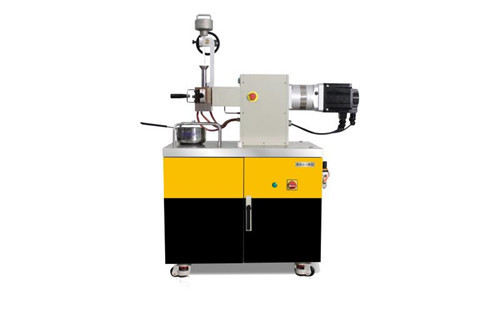Torque rheometer is the study of material flow, plasticization, thermal, shear stability of the ideal equipment, the rheometer provides a closer to the actual processing of the dynamic measurement method, can be similar to the actual processing of the situation, continuous, accurate and reliable on the determination of the rheological properties of the material, such as multi-component material mixing, crosslinking curing thermosetting resins, elastomers, vulcanization, the dynamic stability of the material and the effect of screw speed on the processing performance of the system, and so on. The effect of screw speed on the processing performance of the system. Therefore, the torque rheometer is widely used in the plastics processing industry.

The Torque Rheometer is a comprehensive experimental equipment for testing the rheological properties of polymer materials. Its outstanding feature is that it can be close to the real processing conditions, the rheological behavior of the material research. At present, it has been used in the study of plastic processing performance, formulation design, and the measurement of the real rheological parameters of the material to obtain important applications. With the increasingly wide application of the torque rheometer, its composition and performance is also in the continuous development, showing multi-functional, high-performance, high-precision, automation and other trends.
The torque rheometer is mainly composed of two main parts: measurement and control host and function unit. The measurement and control host provides the basic working environment of the torque rheometer, accomplishes various data acquisition and recording, and provides power and control for each functional unit. Functional unit is to achieve a variety of measurement functions, has been widely used, twin-rotor mixer, single-screw extruder, parallel twin-screw extruder, conical twin-screw extruder, impurity meter, die expansion meter, a variety of extrusion molds and so on. Each functional unit is connected to the host computer in the form of building blocks, and supported by the corresponding software to realize specific experiments, measurements and analysis functions. The following is a detailed description of the structure and performance of each part.
Applications of the torque rheometer in the plastics processing industry: e.g. material modification studies, impurity measurement, tensile rheology.
Material modification studies.
An important method of plastic modification is compounding modification, in order to achieve the purpose of modification, it is often necessary to experiment dozens or even hundreds of formulas, the mixer is suitable for this kind of work. Co-mingled materials in the mixer fully mixed, and then crushed, through the single-screw extruder and flat die mold extrusion, and then calendered by the calender can be made into a dumbbell-shaped sample yard into the mechanical properties of the test, but also for rheological testing. After selecting several better formulations, they can be further blended and pelletized on parallel twin-screw extruder for further research and screening to finalize the modification study. This research route is less material and more efficient, which not only saves a lot of research expenses, but also speeds up the research process.
Impurity measurement.
Cross-linked polyethylene manufacturing high-voltage cable insulation, different voltage levels, the size of the impurities in the insulation material and contains clear industry standards, so the impurity detection in the material is an important part of the cable material and cable production. The use of torque rheometer single-screw extruder with flat die mold will be measured material made of thin film, and then make it through the impurity meter, you can quickly and accurately complete the impurity measurement. This is currently the only effective way to measure impurities.
Tensile Rheology.
In the blown film, casting, spinning and other processes, polymer melt strength and critical tensile strength is an important parameter, the use of torque rheometer and a simple additional device can be convenient to obtain these parameters with the advancement of technology and the application of the needs of the torque rheometer itself will continue to develop and improve the application of polymer materials and products in the field of scientific research and production will become more and more extensive and in-depth.
